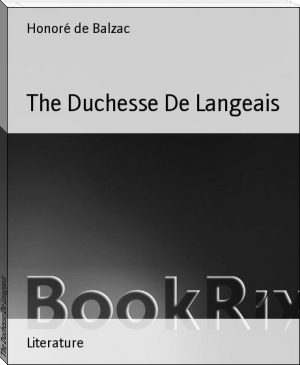The Thirteen by Honoré de Balzac (book club books .txt) 📖

- Author: Honoré de Balzac
Book online «The Thirteen by Honoré de Balzac (book club books .txt) 📖». Author Honoré de Balzac
Many women, returning from a ball, impatient for their beds, throw off their gowns, their faded flowers, their bouquets, the fragrance of which has now departed. They leave their little shoes beneath a chair, the white strings trailing; they take out their combs and let their hair roll down as it will. Little they care if their husbands see the puffs, the hairpins, the artful props which supported the elegant edifices of the hair, and the garlands or the jewels that adorned it. No more mysteries! all is over for the husband; no more painting or decoration for him. The corset--half the time it is a corset of a reparative kind--lies where it is thrown, if the maid is too sleepy to take it away with her. The whalebone bustle, the oiled-silk protections round the sleeves, the pads, the hair bought from a coiffeur, all the false woman is there, scattered about in open sight. _Disjecta membra poetae_, the artificial poesy, so much admired by those for whom it is conceived and elaborated, the fragments of a pretty woman, litter every corner of the room. To the love of a yawning husband, the actual presents herself, also yawning, in a dishabille without elegance, and a tumbled night-cap, that of last night and that of to-morrow night also,--"For really, monsieur, if you want a pretty cap to rumple every night, increase my pin-money."
There's life as it is! A woman makes herself old and unpleasing to her husband; but dainty and elegant and adorned for others, for the rival of all husbands,--for that world which calumniates and tears to shreds her sex.
Inspired by true love, for Love has, like other creations, its instinct of preservation, Madame Jules did very differently; she found in the constant blessing of her love the necessary impulse to fulfil all those minute personal cares which ought never to be relaxed, because they perpetuate love. Besides, such personal cares and duties proceed from a personal dignity which becomes all women, and are among the sweetest of flatteries, for is it not respecting in themselves the man they love?
So Madame Jules denied to her husband all access to her dressing-room, where she left the accessories of her toilet, and whence she issued mysteriously adorned for the mysterious fetes of her heart. Entering their chamber, which was always graceful and elegant, Jules found a woman coquettishly wrapped in a charming _peignoir_, her hair simply wound in heavy coils around her head; a woman always more simple, more beautiful there than she was before the world; a woman just refreshed in water, whose only artifice consisted in being whiter than her muslins, sweeter than all perfumes, more seductive than any siren, always loving and therefore always loved. This admirable understanding of a wife's business was the secret of Josephine's charm for Napoleon, as in former times it was that of Caesonia for Caius Caligula, of Diane de Poitiers for Henri II. If it was largely productive to women of seven or eight lustres what a weapon is it in the hands of young women! A husband gathers with delight the rewards of his fidelity.
Returning home after the conversation which had chilled her with fear, and still gave her the keenest anxiety, Madame Jules took particular pains with her toilet for the night. She wanted to make herself, and she did make herself enchanting. She belted the cambric of her dressing-gown round her waist, defining the lines of her bust; she allowed her hair to fall upon her beautifully modelled shoulders. A perfumed bath had given her a delightful fragrance, and her little bare feet were in velvet slippers. Strong in a sense of her advantages she came in stepping softly, and put her hands over her husband's eyes. She thought him pensive; he was standing in his dressing-gown before the fire, his elbow on the mantel and one foot on the fender. She said in his ear, warming it with her breath, and nibbling the tip of it with her teeth:--
"What are you thinking about, monsieur?"
Then she pressed him in her arms as if to tear him away from all evil thoughts. The woman who loves has a full knowledge of her power; the more virtuous she is, the more effectual her coquetry.
"About you," he answered.
"Only about me?"
"Yes."
"Ah! that's a very doubtful 'yes.'"
They went to bed. As she fell asleep, Madame Jules said to herself:--
"Monsieur de Maulincour will certainly cause some evil. Jules' mind is preoccupied, disturbed; he is nursing thoughts he does not tell me."
It was three in the morning when Madame Jules was awakened by a presentiment which struck her heart as she slept. She had a sense both physical and moral of her husband's absence. She did not feel the arm Jules passed beneath her head,--that arm in which she had slept, peacefully and happy, for five years; an arm she had never wearied. A voice said to her, "Jules suffers, Jules is weeping." She raised her head, and then sat up; felt that her husband's place was cold, and saw him sitting before the fire, his feet on the fender, his head resting against the back of an arm-chair. Tears were on his cheeks. The poor woman threw herself hastily from her bed and sprang at a bound to her husband's knees.
"Jules! what is it? Are you ill? Speak, tell me! Speak to me, if you love me!" and she poured out a hundred words expressing the deepest tenderness.
Jules knelt at her feet, kissed her hands and knees, and answered with fresh tears:--
"Dear Clemence, I am most unhappy! It is not loving to distrust the one we love. I adore you and suspect you. The words that man said to me to-night have struck to my heart; they stay there in spite of myself, and confound me. There is some mystery here. In short, and I blush to say it, your explanations do not satisfy me. My reason casts gleams into my soul which my love rejects. It is an awful combat. Could I stay there, holding your head, and suspecting thoughts within it to me unknown? Oh! I believe in you, I believe in you!" he cried, seeing her smile sadly and open her mouth as if to speak. "Say nothing; do not reproach me. Besides, could you say anything I have not said myself for the last three hours? Yes, for three hours, I have been here, watching you as you slept, so beautiful! admiring that pure, peaceful brow. Yes, yes! you have always told me your thoughts, have you not? I alone am in that soul. While I look at you, while my eyes can plunge into yours I see all plainly. Your life is as pure as your glance is clear. No, there is no secret behind those transparent eyes." He rose and kissed their lids. "Let me avow to you, dearest soul," he said, "that for the last five years each day has increased my happiness, through the knowledge that you are all mine, and that no natural affection even can take any of your love. Having no sister, no father, no mother, no companion, I am neither above nor below any living being in your heart; I am alone there. Clemence, repeat to me those sweet things of the spirit you have so often said to me; do not blame me; comfort me, I am so unhappy. I have an odious suspicion on my conscience, and you have nothing in your heart to sear it. My beloved, tell me, could I stay there beside you? Could two heads united as ours have been lie on the same pillow when one was suffering and the other tranquil? What are you thinking of?" he cried abruptly, observing that Clemence was anxious, confused, and seemed unable to restrain her tears.
"I am thinking of my mother," she answered, in a grave voice. "You will never know, Jules, what I suffer in remembering my mother's dying farewell, said in a voice sweeter than all music, and in feeling the solemn touch of her icy hand at a moment when you overwhelm me with those assurances of your precious love."
She raised her husband, strained him to her with a nervous force greater than that of men, and kissed his hair, covering it with tears.
"Ah! I would be hacked in pieces for you! Tell me that I make you happy; that I am to you the most beautiful of women--a thousand women to you. Oh! you are loved as no other man ever was or will be. I don't know the meaning of those words 'duty,' 'virtue.' Jules, I love you for yourself; I am happy in loving you; I shall love you more and more to my dying day. I have pride in my love; I feel it is my destiny to have one sole emotion in my life. What I shall tell you now is dreadful, I know--but I am glad to have no child; I do not wish for any. I feel I am more wife than mother. Well, then, can you fear? Listen to me, my own beloved, promise to forget, not this hour of mingled tenderness and doubt, but the words of that madman. Jules, you _must_. Promise me not to see him, not to go to him. I have a deep conviction that if you set one foot in that maze we shall both roll down a precipice where I shall perish--but with your name upon my lips, your heart in my heart. Why hold me so high in that heart and yet so low in reality? What! you who give credit to so many as to money, can you not give me the charity of faith? And on the first occasion in our lives when you might prove to me your boundless trust, do you cast me from my throne in your heart? Between a madman and me, it is the madman whom you choose to believe? oh, Jules!" She stopped, threw back the hair that fell about her brow and neck, and then, in a heart-rending tone, she added: "I have said too much; one word should suffice. If your soul and your forehead still keep this cloud, however light it be, I tell you now that I shall die of it."
She could not repress a shudder, and turned pale.
"Oh! I will kill that man," thought Jules, as he lifted his wife in his arms and carried her to her bed.
"Let us sleep in peace, my angel," he said. "I have forgotten all, I swear it!"
Clemence fell asleep to the music of those sweet words, softly repeated. Jules, as he watched her sleeping, said in his heart:--
"She is right; when love is so pure, suspicion blights it. To that young soul, that tender flower, a blight--yes, a blight means death."
When a cloud comes between two beings filled with affection for each other and whose lives are in absolute unison, that cloud, though it may disperse, leaves in those souls a trace of its passage. Either love gains a stronger life, as the earth after rain, or the shock still echoes like distant thunder through a cloudless sky. It is impossible to recover absolutely the former life; love will either increase or diminish.
At breakfast, Monsieur
 Have you ever thought about what fiction is? Probably, such a question may seem surprising: and so everything is clear. Every person throughout his life has to repeatedly create the works he needs for specific purposes - statements, autobiographies, dictations - using not gypsum or clay, not musical notes, not paints, but just a word. At the same time, almost every person will be very surprised if he is told that he thereby created a work of fiction, which is very different from visual art, music and sculpture making. However, everyone understands that a student's essay or dictation is fundamentally different from novels, short stories, news that are created by professional writers. In the works of professionals there is the most important difference - excogitation. But, oddly enough, in a school literature course, you don’t realize the full power of fiction. So using our website in your free time discover fiction for yourself.
Have you ever thought about what fiction is? Probably, such a question may seem surprising: and so everything is clear. Every person throughout his life has to repeatedly create the works he needs for specific purposes - statements, autobiographies, dictations - using not gypsum or clay, not musical notes, not paints, but just a word. At the same time, almost every person will be very surprised if he is told that he thereby created a work of fiction, which is very different from visual art, music and sculpture making. However, everyone understands that a student's essay or dictation is fundamentally different from novels, short stories, news that are created by professional writers. In the works of professionals there is the most important difference - excogitation. But, oddly enough, in a school literature course, you don’t realize the full power of fiction. So using our website in your free time discover fiction for yourself. 




Comments (0)